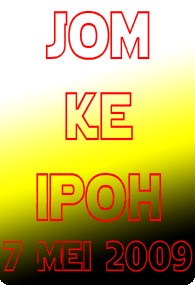Zambry bans press from May 7 sitting, only ‘main media’ allowed

By Wong Choon Mei, Suara Keadilan
Perak BN Menteri Besar Zambry Kadir has been condemned for imposing a press ban aimed at preventing independent coverage of the May 7 legislative sitting, where Umno-BN assemblymen are widely expected to flout state laws in a bid to hammer through the political will of Prime Minister Najib Razak.
According to a statement released by the state information department, only a small number of journalists from 13 select “main media” will be allowed in.
The 13 are three television stations RTM, BernamaTV and TV3 and 10 newspapers The Star, New Straits Times, Berita Harian, Utusan Malaysia, China Press, Sin Chew Daily, Nanyang Siang Pau, Tamil Namban, Tamil Nesan and Bernama.
Each of these ‘Umno-friendly’ organisations will be permitted to sign in a maximum of two journalists each, while the TV stations will be allowed to send three crew each.
All other media including Internet-based Malaysiakini, Malaysian Insider, Harakah and Suara Keadilan, will be barred from entering the assembly hall. The foreign press was also banned.
Cheating inside the hallowed House
Meanwhile, Zambry has been tightening security not just at the Perak Darul Ridwan Building, where the legislative assembly hall is located, but police check-points have been set up at all main trunks roads into and out of the state.
Raja Petra Kamarudin, the country’s most popular blogger, is expecting a huge turnout as Perak people and Malaysians from other states show up to signal their displeasure for Zambry and his team.
Despite having staged their unpopular power grab in February, they have not been able to gain public acceptance, stubbornly ignoring the nationwide clamouring for them to stand down.
Nizar Jamaluddin, the popular Pakatan Menteri Besar, has signalled that his coalition will attend next week’s sitting but under protest. The Pakatan has promised to fight for the snap election that Perak folk are demanding. State-wide polls would allow Perakians to choose their own leadership, rather than be forced to accept an unpopular state government foisted on them by Najib.
The Umno coup was hatched by Najib, who convinced the Perak Sultan to ignore Nizar’s request for fresh polls even though Nizar was still the chief minister at that time and had the right to seek dissolution of the assembly.
How to get a fair hearing ?
Nizar has since launched a lawsuit against Zambry, challenging the legitimacy of his appointment and the case is due to be heard on May 5 and 6.
However, few Malaysians expect Nizar to get a fair hearing, given Najib’s past record of using foul ways and means, including abusing federal institutions, such as the police and the courts, to support his schemes.
In fact, two key decisions with far-reaching implications made by the Federal Court earlier this month regarding the powers of the Perak Speaker have sparked public outcry and sharp condemnation by the legal fraternity.
“The declaration from the Federal Court is incorrect in law and the written judgment has not been made. I wonder if the judges would ever make one given the problem with their ruling,” said Aziz Bari, a constitutional law expert and professor at the Islamic International University.
Zambry himself is not expecting the court to hand him anything other than victory on May 6. So confident is he that he thought nothing of controversially calling for the assembly sitting the very next day. He plans to push through a motion to remove the Speaker, V Sivakumar, on May 7.
Meanwhile, security will be tightened at the state secretariat building, which also houses government offices. It will be closed to the public from May 6 to May 11.
Police are also expected to maintain a high presence in the vicinity of the building, which is likely to be cordoned off as it was in March, when Najib and Zambry actually locked the main gates and ordered the police to prevent Pakatan assemblymen, led by Sivakumar, from holding an emergency sitting in the assembly hall.
“The situation is one of lawlessness. The police, instead of protecting the Speaker, instead committed a crime by obstructing or preventing him and other assemblymen them from entering the premises. So much so that the sitting had to be conducted under a tree. It is a pity that the court chose to take the same direction instead of upholding the law,” said Aziz.

